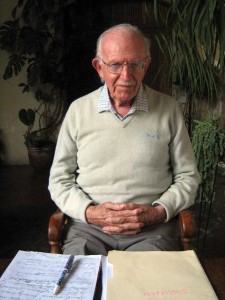Dr. Johnny Long
 To those who knew and loved him in La Antigua Guatemala, he was Johnny. It was the name coined by colleagues at Duke University School of Medicine when the name given him in 1920, Ernest Croft Long, did not easily roll off the tongue. He joined the Duke faculty in 1956, having graduated from the University of London and lectured at St. Mary’s Hospital Medical School from 1954-1956. He had also served in the British Royal Air Force during World War II.
To those who knew and loved him in La Antigua Guatemala, he was Johnny. It was the name coined by colleagues at Duke University School of Medicine when the name given him in 1920, Ernest Croft Long, did not easily roll off the tongue. He joined the Duke faculty in 1956, having graduated from the University of London and lectured at St. Mary’s Hospital Medical School from 1954-1956. He had also served in the British Royal Air Force during World War II.
At Duke, Dr. Long studied pediatrics, taught community health sciences, was associate dean of medical student affairs, then associate dean of undergraduate medical education and chair of the Committee on International Studies, as well as director of Project Med-Aid, a Duke radio consultative program which used radio communications to assist isolated doctors in other countries.
A man of many talents, Johnny followed his interest in international health on a sabbatical year to Guatemala in 1971. As a member of the United States Agency for International Development (USAID) and sponsored by The Rockefeller Foundation, he worked on developing a training program to provide basic health care in remote, rural areas of the country. He negotiated the gift of the Hospital Quirigua, built by United Fruit Company in 1913 and abandoned in 1960, to the Guatemala Ministry of Public Health and Social Assistance to be refurbished for the training center. “In many places the grass and undergrowth had risen to shoulder height…a few cows and horses were grazing in the tangle,” wrote Johnny.
“It was covered in mildew and moss,” adds Cynthia Burski, now a veterinarian, who also worked for USAID. “For the next seven years he became not only my mentor but a very good friend. Johnny had a ‘hands on’ approach to everything.” She recalls an event during the process of securing the old hospital: “There he was, entertaining everybody in his dignified manner, convincing them of the need for the program, while waiters in white gloves and formal jackets served aspic in 100-degree heat!” Johnny recorded the story of the hospital in The Beloved Doctor Macphail of Quirigua, published in 2006.
“The project had a tremendous impact,” states Elizabeth Bell, a local cultural authority. “It revived that area of the country. He was a real pioneer.” Elizabeth remembers meeting Johnny when she first came to Antigua as a teenager. Always the gentleman, “He loved to engage in in-depth conversation, but not small talk. It wasn’t about him; he talked about concepts and projects.”
Guatemala had gotten a grip on Johnny, and he stayed. After the earthquake in February 1976, he led the USAID medical aid effort, identifying a location to serve as headquarters for treatment and distribution of supplies. He also worked for Project HOPE (Health Opportunities for People Everywhere), expanding his efforts toward sustainable advances in healthcare education programs and humanitarian assistance.
During his medical career, Dr. Long authored dozens of scientific articles. It was only after retirement–if that word can be used honestly when speaking of Johnny–that he began to write fiction. Jane Swezey, who joined Johnny in writing groups for years, remembers the “fun and delight in his creations which gave us such joy.” His book Fiambre Chapin, published in 2009, is a collection of those writings, to which he referred as “musings and meanderings.”
Also in retirement he became the first actor to speak on the stage of the cultural center El Sitio. The Importance of Being Ernest opened with Johnny’s back to the audience. “He kept the audience waiting while he featherdusted a portrait on the wall, then took his time picking up a handkerchief and finally slowly turning around–capturing everyone’s attention. He loved doing things like that!” laughs his wife, Annette.
In fact, “His sense of humor” is Carole Wilson’s response when remembering Johnny. She quickly adds a list of other attributes and tells of Johnny’s dedication to the group in which they worked together to establish a library in Antigua in the mid 1990s. “He did all the computer work and was a daily presence.” The Duane Carter Library continues to function, a valuable resource for students. Carole also notes that Johnny was a good cook and names his mango chutney as outstanding.
Johnny took cooking classes from Audrey Buderus in Antigua and had many favorites. But her chocolate mousse recipe became his specialty.
Among his recent passions were the December productions of El Grinch, to bring the British tradition of pantomime to Antigua. Debora du Flon, Johnny’s longtime friend who worked with the team of Antigueenos, says, “When the children heard the news they said, ‘Christmas won’t be the same without Johnny.’ He made the season so special.” Johnny himself summed it up best: “The message of El Grinch is clear. Good triumphs over evil, and humor lightens the load of life.”
Words to live by. And he did. Johnny, Dr. E. Croft Long, passed away peacefully on September 2, 2011, but his memory will live on for a long, long time.
You mentioned Jane Swezey in this tribute, and I would so love to reestablish contact with her. She was a dear friend and mentor at the University of the Americas, and I last saw her in Antigua in 1979. Is she well? I would love to learn about her and how to contact her.
Thank you,
Mary Maggi
Norman, OK
USA